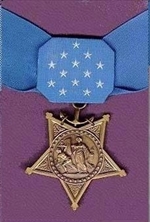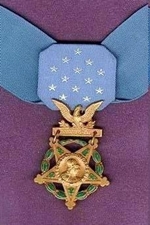 Medal of Honor Citation: Stanley Bender
Medal of Honor Citation: Stanley Bender
Rank and organization: Staff Sergeant, U.S. Army, Company E, 7th Infantry, 3d Infantry Division.
Place and date: Near La Lande, France, 17 August 1944.
Entered service at: Chicago, 111.
Born: 31 October 1909, Carlisle, W. Va.
G.O. No.: 7, 1 February 1945.
Citation: For conspicuous gallantry and intrepidity at risk of life above and beyond the call of duty. On 17 August 1944, near La Lande, France, he climbed on top of a knocked-out tank, in the face of withering machinegun fire which had halted the advance of his company, in an effort to locate the source of this fire. Although bullets ricocheted off the turret at his feet, he nevertheless remained standing upright in full view of the enemy for over 2 minutes. Locating the enemy machineguns on a knoll 200 yards away, he ordered 2 squads to cover him and led his men down an irrigation ditch, running a gauntlet of intense machinegun fire, which completely blanketed 50 yards of his advance and wounded 4 of his men. While the Germans hurled hand grenades at the ditch, he stood his ground until his squad caught up with him, then advanced alone, in a wide flanking approach, to the rear of the knoll. He walked deliberately a distance of 40 yards, without cover, in full view of the Germans and under a hail of both enemy and friendly fire, to the first machinegun and knocked it out with a single short burst. Then he made his way through the strong point, despite bursting hand grenades, toward the second machinegun, 25 yards distant, whose 2-man crew swung the machinegun around and fired two bursts at him, but he walked calmly through the fire and, reaching the edge of the emplacement, dispatched the crew. Signaling his men to rush the rifle pits, he then walked 35 yards further to kill an enemy rifleman and returned to lead his squad in the destruction of the 8 remaining Germans in the strong point. His audacity so inspired the remainder of the assault company that the men charged out of their positions, shouting and yelling, to overpower the enemy roadblock and sweep into town, knocking out 2 antitank guns, killing 37 Germans and capturing 26 others. He had sparked and led the assault company in an attack which overwhelmed the enemy, destroying a roadblock, taking a town, seizing intact 3 bridges over the Maravenne River, and capturing commanding terrain which dominated the area.
 Medal of Honor Citation: Mervyn Sharp Bennion
Medal of Honor Citation: Mervyn Sharp Bennion